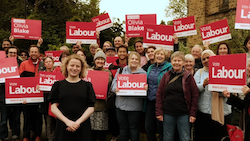Labour’s landslide victory is cause for celebration but serious challenges lie ahead for the party, the government and UK politics, says WILL BROWN.
For those under 20 this is a first experience of a Labour victory and you have to be over 27 to have been alive when a Tory government last gave way to a Labour one.
 To have Labour wash away the blithe arrogance, corruption and privileged incompetence that characterised the Conservative’s 14 years in power should give us all pleasure without need for qualification.
To have Labour wash away the blithe arrogance, corruption and privileged incompetence that characterised the Conservative’s 14 years in power should give us all pleasure without need for qualification.
The 2024 election has seen the departure of two former prime ministers and a record number of cabinet ministers including some of those responsible for the calamitous handling of Brexit, the corruption of the pandemic and the catastrophic mis-management of the economy.
More seriously, in a context where the lights are going out in Europe and America, as the Guardian’s Marina Hyde wrote, while hard right and extremist parties are gaining ground elsewhere, “here – in this country, in this moment – a different direction has been taken. That matters today and anyone not on the wingnut fringe … would wish Starmer good luck with his task.”
The complex result
Reviewing the details of the result is a more complex matter, however, because underneath the massive seats haul is a very mixed picture.
Overall turnout was 60%, the lowest since 2001 when it was 59.4%. In both cases, the outcome seemed so settled before polling day that it may have contributed to voter apathy, although the current deep-seated disenchantment with politics exceeds that of the early noughties.
A few salient points should give Labour some pause for thought:
- despite the 170 seat majority, Labour barely increased its vote share from the disastrous 2019 election under Jeremy Corbyn – a key point on which the main opinion polls were significantly off target
- all main parties other than the Greens and Reform won fewer votes than in 2019
- the Liberal democrats increased their vote share by just 0.7% and yet their seat haul increased by 60.
| Seats (2019 in brackets) |
Vote share (%; 2019 in brackets) |
Number of votes (2019 in brackets) |
|
| Labour | 410 (203) |
33.9 (32.2) |
9,660,081 (10,295,912) |
| Conservatives | 121 (365) |
23.6 (43.6) |
6,755,953 (13,966,451) |
| Reform | 5 | 14.3 | 4,072,947 |
| Liberal Democrats | 71 (11) |
12.2 (11.5) |
3,487,568 (3,696,419) |
| Greens | 4 (1) |
6.8 (2.7) |
1,931,880 (865,707) |
| SNP | 9 | 2.4 | 685,405 (1,242,380) |
| Plaid Cymru | 4 | 0.7 | 194,811 (153,265) |
For once, the first past the post system worked to Labour’s advantage delivering an incredibly efficient return of seats to votes cast – two thirds of the seats in parliament on one third of the vote. This was a product of a combination of factors, including low turnout, the performance of the Liberal Democrats and Reform, and the scale of tactical voting, which seems to have exceeded previous elections.
The collapse of the SNP in Scotland also played a part. It was much less heralded than the rise of other small parties and added substantially to the scale of Labour’s win. It also enables Starmer to claim a clear mandate there and in Wales, pushing aside major constitutional concerns for the time being (although not in Northern Ireland where the party still refuses to allow Labour to challenge the sectarian party system).
 However, the result was also down to Labour’s deliberate strategy of maximising seats not votes. Everything – money, organisation, media – was directed at winning in Tory areas rather than ensuring success in those Labour already held.
However, the result was also down to Labour’s deliberate strategy of maximising seats not votes. Everything – money, organisation, media – was directed at winning in Tory areas rather than ensuring success in those Labour already held.
The control freakery, characteristic of Starmer’s management of the party over the past few years, was clearly evident during the campaign, with some existing MPs cut off from party data bases and campaign resources, and barred from campaigning in their own constituencies until they had spent enough time in target seats. Indeed, Labour’s vote fell in many it already held. That may have been due in part to low turn-out but it’s also because some progressive voters opted for Green or Independent candidates.
Inevitably, this produced some self-inflicted wounds: standing a non-entity with a background in private healthcare against Jeremy Corbyn in Islington; removing Faiza Shaheen as the candidate for Chingford and Woodford Green, splitting the Labour vote and enabling Iain Duncan Smith to cling on; and its hugely misjudged stance in the early days of the Gaza war that allowed independents to gain a number of other seats.
However, it means Starmer’s achievement is built on shaky foundations. Combined with ever-accelerating voter volatility, it’s a monument that can so easily be blown away. Writing in the Observer, Rob Ford likened Labour’s strategy to a game of Jenga where players take pieces from the base of the tower to increase its height at the top. Whether it can build a record in government to shore up the coalition it has created, or build a new, more robust one before the next election, remains to be seen.
The rise of Reform
Another danger, and one that could easily further weaken the foundations of Starmer’s electoral coalition, is the rise of Reform. That it claimed third spot in the popular vote is frightening in itself, while the combined Conservative and Reform share was 38% despite Nigel Farage only entering the fray in June and the Conservatives running one of the worst campaigns in their history. Farage’s threat to “come for Labour” and “stun the country” is a taste of what may lie ahead.
Farage has also tried to seize the mantle of electoral reform, something that will make life somewhat uncomfortable for Liberals and other progressive PR supporters. Having made such good use of first past the post, Labour is unlikely to do anything significant on this front in the near future. Denying the arguments for electoral reform, however, will add further grist to Farage’s populist mill, allowing him to portray it as the establishment conspiring to deny the people’s wishes.
So far, Labour has done little to challenge Reform, quietly sitting on the sidelines and reaping the benefit in lost Tory seats. But support for Reform is strong in many Labour areas too, and the Labour government has an urgent task to show it can deliver tangible change.
To challenge Reform, Labour will also need a political strategy that goes beyond calling out its racism and bigotry. Populists like Farage thrive on such notoriety, saying the unsayable, claiming the authenticity that goes with it. There will need to be tangible benefits to those on low wages in economically stagnant regions alongside a political promotion of the role of the state, and of the Labour government, in delivering those benefits. This is something New Labour always shied away from, and they (and we) paid the price.
The Left’s response
Considering the left’s response to Starmer’s victory requires a little humility. For the fourth time in 30 years, the right of the party has delivered a general electoral victory. The left has to go back to 1945 to make such a claim and, mythology and world wars aside, that was in any case a mixed picture.
 So whatever criticisms we may have of the path Labour has taken, we do have to acknowledge that it has successfully delivered a thumping parliamentary majority. That success makes our task very difficult in the short term.
So whatever criticisms we may have of the path Labour has taken, we do have to acknowledge that it has successfully delivered a thumping parliamentary majority. That success makes our task very difficult in the short term.
Some will argue that Labour would have done even better with a bolder manifesto. Perhaps, although it seems unlikely in terms of seats gained. It’s true that some of the Labour seats where advances were made on 2019 are held by left-wing MPs: John McDonnell; Olivia Blake in Sheffield Hallam increasing her majority from 700 to over 8,000 (pictured above); and Zara Sultana in Coventry South doing similar.
It might be more plausible for the left to argue that now Labour has won a landslide it has the parliamentary leverage push the boundaries of its pledges. There is some room for that approach, although radical departures from what has been promised would undermine the leadership’s over-riding mission to rebuild trust in politics.
And as Andy Beckett argued in the Guardian, more left-leaning cabinet members, such as Ed Miliband and Angela Raynor, will need support inside parliament and out, to shore up Labour’s progressive commitments on climate action and workers’ rights.
As I argued in my pre-election piece, several voices have called for tax reforms that don’t include rises in income tax and VAT, and those options may become necessary sooner rather than later. What’s more, the left will need to continue to work with groups outside parliament, campaigning on climate change, river pollution, the cost of living and other issues.
More long term, should Starmer’s mission to rebuild trust, competence and stability prove successful, there will then be a struggle over the future direction of his government.
On a broader note, one lesson to be learned from recent efforts to combat populism is that cooperation between centrist and left-wing forces is vital. We can see that to some extent in Biden’s defeat of Trump in 2020. And although the news from France is mixed, there too a far-right surge seems to have been stalled, temporarily at least, through fragile collaboration among a range of left of centre groups.
Whether Labour’s left and right – particularly the right – are able to put aside hostilities and recognise the advantages of such alliances remains to be seen. This election has accelerated the threat of populism and the fragmentation of UK politics. Arguably, that makes such alliances even more important.
—-
See also: ‘Labour’s Manifesto: Policies & Prospects’ by Will Brown.



16 July 2024
Will has posted a really good piece which deserves wider consideration and response. A few observations of my own follow.
First, tactical voting played a massive part in this election, particularly in those seats where Lib Dem MPs unseated sitting Tories. For that reason, I think a lot of care should be taken on vote share comparisons with 2019. Labour benefited from a very deep desire among voters to remove the Tories as their first priority, and they made countless individual decisions as to how best that might be achieved.
Secondly, I am not sure how helpful the terms ‘left’ and ‘right’ are in analysis of this kind. Was it the right, or was it local campaigning and activism that delivered local success? Was/is Labour’s programme ‘right wing’? Or does it, rather, contain a mixture of both modest and radical elements? There is some good stuff in the manifesto and on which we should build – the doubling of the co-operative sector and the new deal for working people come to mind.
How all this unfolds is not a given but will depend on both internal and external pressures for more radical change.
Incidentally, the idea that the Attlee government of 1945-50 and 1950-1951 was ‘left’ really is problematic. Of course, its legacy was real and substantial but those who hold it up as a left-wing victory really should revisit the history of the period. It represented the worthy continuation of war-time collectivism into post-war rebuilding but was heavily criticised at the time for being too right-wing from the left of the day (see the ‘Keep Left’ group as one example). Labour governments have always been criticised from the left, and achievements only recognised after the event.
Third, to embrace proportional representation now would be madness, and not just because it would energise the populist right. There is a strong case for electoral reform but there is not – in my view – a strong case for PR, which gives disproportionate powers to minority parties. The current influence of the hard right in Israel (elected under PR) should surely give us all pause for thought. There is another option, which is the Alternative Vote.
Finally, Will is spot on in recognising the need for a broad common-cause to be made across the party (and beyond) against Reform. It is time to move beyond the battles of the past. There is now a bigger enemy to fight in Faragism and that should bring us all together. If the ILP can encourage that, it would represent a really good piece of political work.